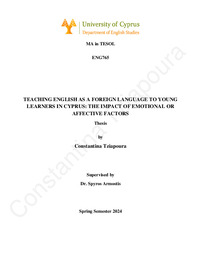| dc.contributor.advisor | Armostis, Spyros | en |
| dc.contributor.author | Tziapoura, Constantina | en |
| dc.coverage.spatial | Cyprus | en |
| dc.creator | Tziapoura, Constantina | en |
| dc.date.accessioned | 2024-04-18T11:38:37Z | |
| dc.date.available | 2024-04-18T11:38:37Z | |
| dc.date.issued | 2024-04 | |
| dc.identifier.uri | http://gnosis.library.ucy.ac.cy/handle/7/66174 | en |
| dc.description.abstract | The present study primarily investigated the role of emotions and affective domain in learning English
as a foreign language, regarding primary-level young students in Cyprus. The study was based on
Krashen’s Affective Filter Hypothesis on English as a Foreign Language, which states that affective
factors, such as fear, anxiety, and boredom, can have a significant effect on the acquisition of a second
or foreign language. Thus, the aim of the MA thesis was to explore the role of emotions and the affective
domain, as a result of the teaching method, on students’ grammar performance. To this end, a quasi-experimental study was conducted in a Private Institute in Cyprus. A limitation of the study was that
the sample was limited as only 21 students participated in the study. The participants were assigned to
three different groups, according to their class. Each group was instructed and tested with a different
teaching approach (Group A=Silent Way, Group B=Communicative Language Learning, Group
C=Cooperative Learning). After the intervention lesson (60 minutes), the participants completed an
evaluation form with five questions, in which they expressed their feelings about the lesson with a five point Likert scale. Another research tool was the grammar test, which was administered pre and post test. A limitation of the methodology was that the data were collected just from the questionnaire and
the test. The results of the study showed that the application of the three methods did not lead to
significant changes in the students’ emotions or their grammar scores. Even though the study did not
lead to significant results, it could be used as a preliminary indication of how the focus on emotions
and the affective domain could be used in the classroom so that a positive learning atmosphere may be
established. | en |
| dc.language.iso | eng | en |
| dc.publisher | Πανεπιστήμιο Κύπρου, Σχολή Ανθρωπιστικών Επιστημών / University of Cyprus, Faculty of Humanities | |
| dc.rights | info:eu-repo/semantics/openAccess | en |
| dc.rights | Open Access | en |
| dc.rights | Attribution-NonCommercial-NoDerivs 3.0 Greece | * |
| dc.rights.uri | http://creativecommons.org/licenses/by-nc-nd/3.0/gr/ | * |
| dc.title | Teaching English as a Foreign Language to Young Learners in Cyprus: the Impact of Emotional or Affective Factors | en |
| dc.type | info:eu-repo/semantics/masterThesis | en |
| dc.contributor.committeemember | Karpava, Sviatlana | en |
| dc.contributor.department | Πανεπιστήμιο Κύπρου, Σχολή Ανθρωπιστικών Επιστημών, Τμήμα Αγγλικών Σπουδών | el |
| dc.contributor.department | University of Cyprus, Faculty of Humanities, Department of English Studies | en |
| dc.subject.uncontrolledterm | ΔΙΔΑΣΚΑΛΙΑ ΑΓΓΛΙΚΗΣ ΓΛΩΣΣΑΣ | el |
| dc.subject.uncontrolledterm | ENGLISH LANGUAGE TEACHING | en |
| dc.author.faculty | Σχολή Ανθρωπιστικών Επιστημών / Faculty of Humanities | |
| dc.author.department | Τμήμα Αγγλικών Σπουδών / Department of English Studies | |
| dc.type.uhtype | Master Thesis | en |
| dc.contributor.orcid | Armostis, Spyros [0000-0003-2927-2096] | |
| dc.contributor.orcid | Karpava, Sviatlana [0000-0001-8416-1431] | |
| dc.gnosis.orcid | 0000-0003-2927-2096 | |
| dc.gnosis.orcid | 0000-0001-8416-1431 | |


